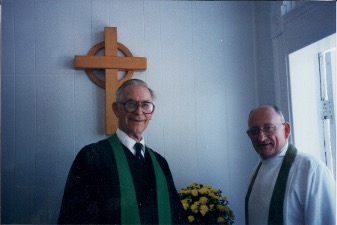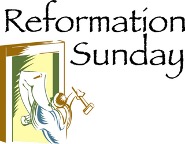
On October 12, 1980, the charter that established our church as Heritage Presbyterian Church was formally signed. The first pastor was Rev. Ozzie Lutz (on the left), a truly beloved man, who helped shape the first eight years of our church history. Many young families helped to form the backbone of that first congregation that brought us here today. On this Reformation Sunday, the anniversary of the beginning of the Protestant Reformation, it is altogether fitting and proper that we take a moment to remember, celebrate, and thank those early folks who loved our church and helped to establish it in the Cypress area. Oh, be joyful!

In two weeks, your Session will gather to write the draft form of our 2023 church budget. Please prayerfully consider your own time, talent or treasure as you decide upon your tithe. And please pray for your Session!

The Protestant Reformation was a major 16th century European movement aimed initially at reforming the beliefs and practices of the Roman Catholic Church. Its religious aspects were supplemented by ambitious political rulers who wanted to extend their power and control at the expense of the Church. The Reformation ended the unity imposed by medieval Christianity and signaled the beginning of the modern era.
On October 31, 1517, in one of the signal events of western history, Martin Luther, a German Augustinian monk, posted 95 theses on the church door in the university town of Wittenberg. That act was common academic practice of the day and served as an invitation to debate. Luther himself never sought to do anything other than begin a debate in the church on whether or not the church should address his ideas. However, Luther’s propositions directly challenged some portions of Roman Catholic doctrine and a number of specific practices.
Luther argued that the Bible, not the pope, was the central means to discern God’s word — a view that raised eyebrows in Rome. Further, Luther maintained that justification (salvation) was granted by faith alone; good works and the sacraments were not necessary to be saved.
Luther had been especially appalled by a common church practice of “selling indulgences.” These papal documents were sold as promises for the remission of sins. To Luther and other critics, it appeared that salvation was for sale. Rome enthusiastically supported the use of indulgences to raise money for the huge construction of St. Peter’s Basilica in Rome.
There was nothing secret about Luther’s challenges. He sent a copy to his bishop, who in turn forwarded the theses to Rome. Support for the Protestant Reformation came from sincere religious reformers, while others manipulated the movement to gain control of valuable church property.

TODAY, October 30th
Reformation Sunday
Stump-the-Choir Sunday
Monday, October 31st
All Hallows Eve (AKA Halloween)
Tuesday, November 1st
All Saints’ Day
Sunday, November 6th
Communion Sunday
Gold Bag offering benefitting Free the Captives
Sunday, November 13th
Stewardship pledge cards due
Monday, November 14th
Session meeting, 7:00 PM at the church office
Draft of church budget to be written
“Pie Day” at Postma Elementary School
Sunday, November 27th
First Sunday of Advent